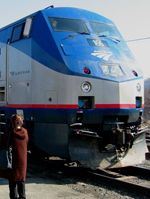The House of Representatives voted 311-104 to pass the $15 billion Passenger Rail Investment and Improvement Act of 2008 (H.R.6003), which will fund Amtrak, the national passenger railroad, for the next five years and help to build new and expand pre-existing rail service. An additional amendment to the bill would authorize $1.5 billion for D.C.’s Metro over the next 10 years. The Senate had also passed the legislation by a veto-proof margin.
The House version of the bill requires that the Department of Transportation request proposals by private companies to construct a high-speed light rail that would travel from New York to the nation’s capital in under two hours. This addition could prove to be problematic when the House and Senate try to hammer out a compromise bill, but some suggest that the involvement of the private sector may attract the support of more Republicans. Even President George W. Bush, who has threatened to veto the bill, professed to liking the privatization aspect of the bill.
The five-year authorization should provide Amtrak with ample time to appropriately plan for a future in which their ridership – judging by last month’s record number of passengers – is very likely to increase. Amtrak expects to have 28 million passengers this year, which would exceed last year’s record of 25.8 million. Ridership has increased on the same routes for each of the last five years.
Opponents argue that the funding will do little to help those affected worst by the energy crisis, as in those who are heavily reliant on automobiles simply because there is no mass transit or passenger rail in their area. Most of Amtrak’s rails are located in the Northeast Corridor, and there are few routes in the South or West. Metro areas in these regions, according to the New York Times, have actually seen an increase in ridership between 10-15 percent or more over the last year.
Amtrak has recognized there is a growing demand for passenger rail in these areas. The legislation provides for a passenger rail study to “determine the potential cost and benefits of expanding passenger rail service options in underserved communities.”
Other critics note that, even though Amtrak has increased its ridership significantly, it spent $1.3 billion more than it earned. Bush has opposed the legislation primarily because of Amtrak’s inability to become a self-sustaining entity. Amtrak’s proponents argue that there is not a single country whose passenger rail system does not receive public support for operating expenses; additionally, the U.S. budget provides sizable funds to maintain our highways.
Once a compromise is reached between the House and Senate, the National Railroad Passenger Corporation will work with the Secretary of Transportation and the states that comprise the Northeast Corridor to devise a capital spending plan to adequately repair tracks, signals, facilities, stations, and equipment.
This plan will be submitted annually to the Secretary of Transportation, as will Amtrak’s yearly budget and business plan. An independent financial consultant with experience in railroad accounting will be hired to improve Amtrak’s financial accounting and reporting system and practices.
Over the past few years, Amtrak has greatly reduced its consumption of diesel fuel. The U.S. Department of Energy has reported that “Amtrak – on an energy consumed per passenger-mile basis – is 18 percent more energy efficient than commercial airlines.” Amtrak is also less affected by changes in the price of crude oil than are commercial airliners.
Though the Amtrak bill will not eliminate our dependence on foreign oil or reduce the effects of global warming, it will certainly represent a step in the right direction on both fronts.


_600_350_80_s_c1.jpg)













